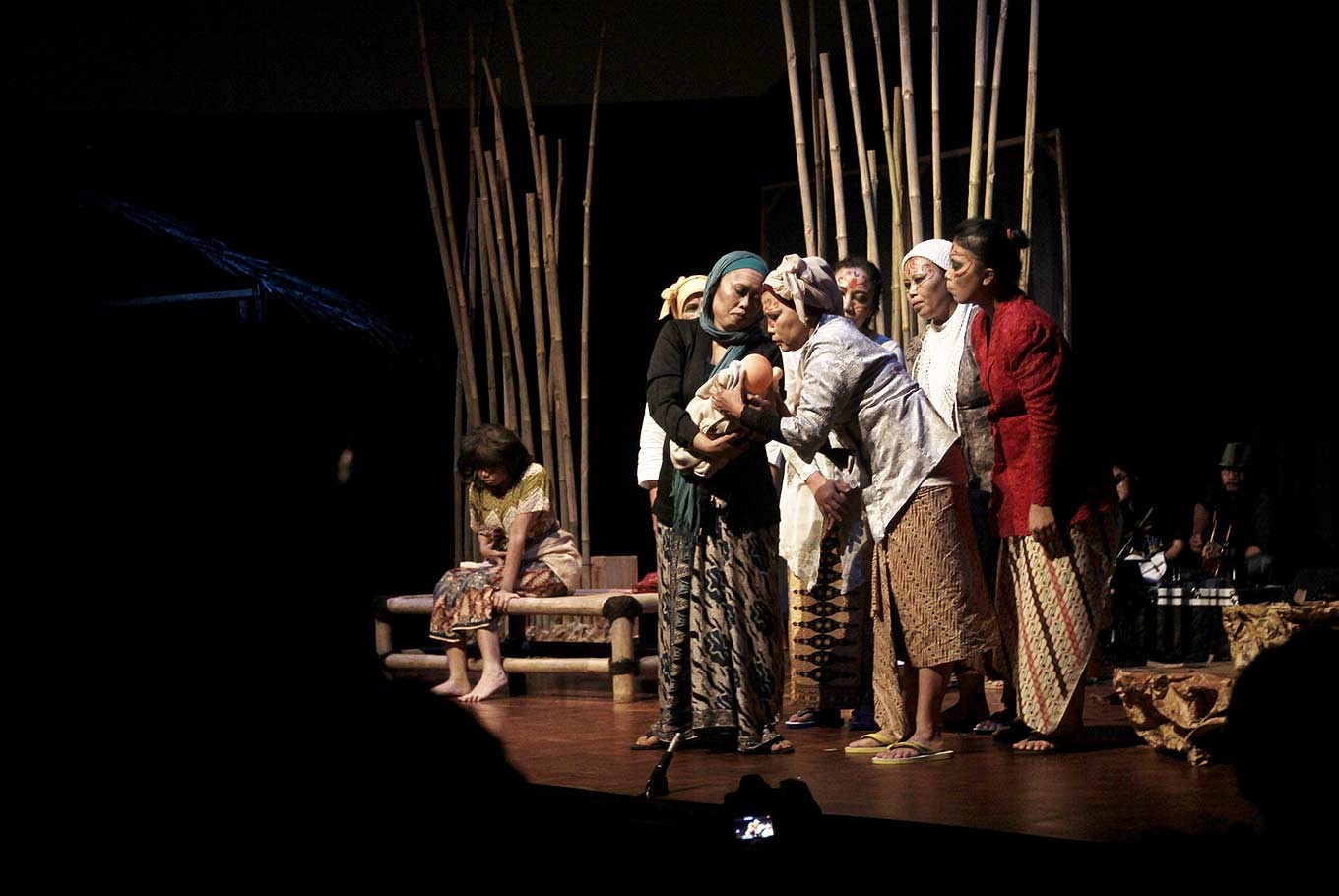Stories of survivors bring audience to tears, awareness
Victims of sexual and systematic violence are called survivors for a reason, because, unlike us, they have to endure their past horrors every single day and live through them.
Change Size
 Speaking up: Activists from LBH APIK and Forum Suara Penyitas stage a play titled Ode Tusuk Konde at the Goethe-Institute cultural center in Menteng, Central Jakarta, on Sunday. The play, held to commerate the final day of the 16 Days of Activism against Gender-Based Violence campaign, aimed to remind the public of rampant violence against women. It was also hoped the play could help survivors of violence to recover. (JP/Ben Latuihamallo)
Speaking up: Activists from LBH APIK and Forum Suara Penyitas stage a play titled Ode Tusuk Konde at the Goethe-Institute cultural center in Menteng, Central Jakarta, on Sunday. The play, held to commerate the final day of the 16 Days of Activism against Gender-Based Violence campaign, aimed to remind the public of rampant violence against women. It was also hoped the play could help survivors of violence to recover. (JP/Ben Latuihamallo)
V
ictims of sexual and systematic violence are called survivors for a reason, because, unlike us, they have to endure their past horrors every single day and live through them.
What these survivors have had to face may be too much for most of us to handle, as evidenced during a recent theatrical show about their struggles. Members of the audience shivered and wept as they heard horrific stories about sexual abuse and systematic violence from those who had experienced them first-hand.
The show was called Ode Tusuk Konde (An Ode of Hair-pin Clip), and despite its modest plot, powerfully gave voice to the pain and struggles of women and children who have experienced sexual abuse and systematic violence.
Staged in Goethe Haus, Menteng, Central Jakarta last Sunday, Ode told the story of Kampung Jugun — a small, remote village that provided protection for women and children marginalized by society after becoming victims of violence.
The play, which was initiated by the Legal Aid Foundation of the Indonesian Women’s Association for Justice (LBH Apik), began with narration of horrific, a real-life stories about sexual abuse and violence, told by the survivors themselves.
“I had hot water poured on me by my boss. One day, he tried to hang me upside-down. He blamed me when his mother died, even though she had been sick for a long time,” said Villager A, played by a former abused maid N.
Other stories included a woman who was gang-raped and then abandoned by her shamed family; a wife who was cheated on by her husband, who then decided he wanted a polygamous marriage; and a mother who found her own daughter raped by her husband.
Nonetheless, sorrow was not at the center of the play’s atmosphere, as in the last half of the show, the village women supported a girl named Kembang in her search for a hairclip so she could be a Ronggeng dancer.
Kembang, played by domestic violence victim IP, eventually met a hermit who handed her a hairclip — a symbol of respect and support for women.
The play itself was initiated in order to raise awareness in Indonesian society about the perspectives of victims, said Veni Siregar, LBH Apik director.
“We are aware that legal protection is only one part of the healing process. For society to hear and acknowledge the perspectives of the victims is an aspiration of those who have suffered,” Veni said.
“Acceptance, support and a nurturing attitude are all important to help the healing process for victims.”
For two and a half months, LBH Apik teamed up with various institutions, like alternative media website konde.co, the National Commission on Violence against Women (Komnas Perempuan) and trauma-counseling foundation Yayasan Pulih, to conduct the musical play, she said.
It was decided that the performance would be held as the peak event of the 16 Days of Activism to Eliminate Violence Against Women, she added.
The 16 Days of Activism to Eliminate Violence Against Women, a global campaign to unite people across the world to end this epidemic, concluded on Dec. 10, which was also Human Rights Day.
The play was also intended to help survivors cope with their trauma, added Agus Tian, the play’s director, who has previously worked on a similar performance with maids who had been abused by their bosses.
“We want to use theater as medium for healing. […] The play was [based on] their [the survivors’] real lives,” Agus said. “We sewed pieces of their experiences into the play.”
During the occasion, IP, who now feels strong enough to be interviewed by journalists, admitted the process that went into creating the play had brought back memories of the trauma and fear she felt from her separated husband, who had also taken her daughter away.
“But I believe life must go on and that God will give me strength,” she said.
“I am thankful to have participated in the play because I had the chance to meet many other survivors and share stories with them about how we try to heal in different ways.”









